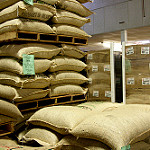What is behind the Green Mermaid?


Last year I had the SSIR: Eating Locally, Thinking Globally. As a result, I became increasingly interested in global food markets on social and environmental levels. When given the opportunity to research a global issue for a class abroad, I found myself drawn to understanding more about industrial agriculture and how it affects the environment and the local farmers. Many international organizations regulate multinational corporations, but to what extent? To begin to understand all these aspects, I found an example in Starbucks. It is a global company which in the past forty years has expanded rapidly to nearly all continents. It is a true product of modern globalization and I wanted to begin to understand why, how, and its overall global impacts.
I wanted to start by understanding if Starbucks stood behind their claims of fair trade coffee and environmentally conscious practices. I found it hard to believe that a company, in which the majority of the customers use disposable cups, can truly be making a positive difference environmentally. More so, there was the question of the workers on the ground in predominately central and south American countries, are they provided with fair wages or is it “modern day slavery” as many would call working conditions for many workers in underdeveloped countries.

To my great surprise, Starbucks is one of the most environmentally conscious
and forward thinking companies I found through my research on differing or competing chains. To be honest, I was hoping that I could do an expose on their practices, but in reality found mostly all positive reports. As a company, their employees in stores have benefits and higher wages, despite being what a food chain is in essence. In addition, they maintain their fair trade promise where their coffee beans are being produced. Their use of paper and plastics cups is staggering; however, they spearhead numerous environmentally sound campaigns and act on them. Despite all the positives, there is a question of the middle man.


In many of these global companies who have either farmers or factory workers in other countries, the company may pay a fair wage; however, by the time it trickles down to the workers on the ground they are not paid a living wage. They maintain their public image and can prove their actions such as paying a fair wage, but often leave out the ending of the story. There is a definite lack in global regulation of multinational corporations. It is important to watch the rhetoric and ensure that what large and multinational corporations are saying, and what they doing, is one in the same.